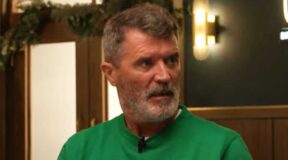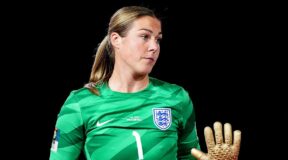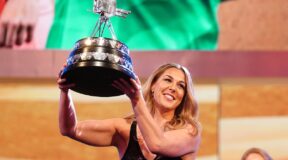LOS ALAMITOS, Calif. — Ashleigh Johnson propelled her torso through the water’s surface, lunged to her left and right and flashed her lightning-quick reflexes during a recent practice that have helped distinguish her as one of the world’s best water polo goalkeepers.
Change can be seen and heard only outside of the pool as Johnson, 26, prepares for the Tokyo Games.
“I've definitely had a lot of conversations — and really, really difficult conversations — especially with people in my sport,’’ she told USA TODAY Sports. “Being a part of a predominantly white sport means that the majority doesn't understand your experience.’’
Five years ago, Johnson was a reluctant trailblazer, the first Black woman to represent the United States in Olympic water polo.
She giddily accepted a gold medal at the 2016 Rio Games as the starting goalkeeper on the U.S. team that thrashed the competition. But she resisted speaking out on behalf of other Black athletes, including those who faced limited opportunities in water polo.
Then came 2020, and the death of George Floyd, and Black Lives Matter marches across America, including Johnson’s hometown of Miami.
“I haven't personally been out to protest,’’ she said. “I haven't felt comfortable engaging in crowds. But I have engaged in the movement in my own ways.’’
Ashleigh Johnson embraces coach Adam Krikorian in the women's water polo medal ceremony at Olympic Aquatics Stadium during the Rio 2016 Summer Olympic Games. (Photo: Peter Casey-USA TODAY Sports)
The change has been most visible during team meetings, said U.S. national team head coach Adam Krikorian.
“In her first four years, you wouldn’t hear a peep,’’ Krikorian said. “Now she is quick to step up and say something she sees that either reinforces what the staff has said or, quite honestly, even goes against maybe what we see and what we’ve said. Which is something that we’ve encouraged all along.
“She’s always been talented, an incredible goalkeeper. I think we’ve all known from the beginning that she could be the best in the world. But the one thing we didn’t know was whether she could add more value, outside the water. And I think that has been the thing that I've been the most proud of, is just to see her growing into that leadership role.’’
Johnson said she wrestled with how her own identity impacted her role as trailblazer. Although she was born in the United States, she is the daughter of Jamaican parents.
She still asks her mother for homemade curry chicken and Ackee and Saltfish, another Jamaican staple.
“Being the first African-American woman to represent the U.S. on the Olympic stage in water polo has come with its own pressures and its own responsibility,’’ she said. “And I, for a long time, wrestled with the idea of who and what I represent outside of the water and inside of the water. And where the lines are drawn between me as a person and who I represent and what I need to do as an athlete.
“It was really overwhelming at first because I didn't understand the context of access to aquatics in the U.S. for African-Americans and a lot of people don't. So I carried the burden of having to explain that to people and break down all of these stereotypes and also fully understand the history of the U.S. as a young woman in the sport. That's a really hard and a big responsibility.’’
Three years ago, she helped start a swim program developed for underserved children who had a very different experience than her own. Johnson and her siblings grew up in a house with a pool in the backyard.
“I had daymares and nightmares about them all drowning,’’ said Johnson’s mother, Donna. “Seriously, if I called the house and nobody answered the phone, I was rushing home because I had visions of everybody drowning. So I had to get them all swim lessons.’’
Ashleigh Johnson of the United States prepares to pass during the game against Australia during the 2016 Olympic team trials on May 22, 2016 in Los Angeles. (Photo: Harry How, Getty Images)
Through swim lessons at a public pool, the Johnson children were introduced to water polo. Soon they were hooked, and Ashleigh Johnson was developing into a star.
At Ransom Everglades High School in Miami, she helped guide the team to three consecutive state championships — and at the same time discovered something troubling about her sport.
When she began traveling to regional and national competitions as a teenager, she was among the few players of color in the pool.
In Miami, she had participated in annual water polo camps run by Genai Kerr, who in 2004 became the first African American to compete for the U.S. national team at the Olympics, and Omar Amr, the son of Egyptian parents who played alongside Kerr.
She also played for Felix Mercado, a prominent coach of Puerto Rican decent. But on the national scene, outside the diversity of Miami, the color of the sport, faded to white.
“That was a huge adjustment as a young girl,’’ she said. “It really made me want to stay home. It made me want to be where I was comfortable to be with my family and with my friends.’’
In 2013 she did leave home, accepting a scholarship at Princeton University, where she finished as the all-time leader in saves. She also returned to the national scene.
In 2016, Johnson trained with Olympic hopes, secured a spot on the roster and earned the job of starting goalkeeper. Since then, she emerged as more than a trailblazer.
“When we travel around the world, she’s a celebrity,’’ Krikorian said. “It is unlike anyone that I’ve ever seen in our sport.
“I think some of it has to do with the color of her skin and the unfamiliarity with that in our sport. And then you combine that with the excellence in which she plays the game and her athleticism. And probably most importantly, just her infectious personality and that smile.’’
It’s a megawatt smile, on display after a recent team practice at the Joint Forces Training Base Aquatic Training Center. But the smile fades when Johnson talks about social issues and how she and other Black athletes are often identified.
She is celebrated for her athleticism, and the gifts are undeniable as she maneuvers her 6-foot-1 frame in the water. But she takes exception to Black athletes like herself being described as “natural athletes.’’
“You're not just born with that,’’ said Johnson, a member of the Alliance for Diversity & Equity in Water Polo. “Doesn't just come to you. You have to put the hours in. You have to grind. You have to work with your teammates.
“We all, as Black athletes, put in the same amount of time and effort to develop and reach this skill level.’’
At the Tokyo Games this summer, she might draw attention outside of the pool, too.
The International Olympic Committee has announced it will uphold Rule 50, which states "no kind of demonstration or political, religious or racial propaganda is permitted in any Olympic sites, venues or other areas.” But Johnson indicated she is willing to violate the rule.
“It's not something that we've discussed as a team, but it is something that I've thought about personally,’’ she said. “I think it's really important that we as athletes take the stage that we have and use it to express our beliefs, and support the people who aren't supported in our society and speak out against the people who are oppressors.
“I just think it's a really important part of having a platform and of being an athlete.’’
Source: Read Full Article




